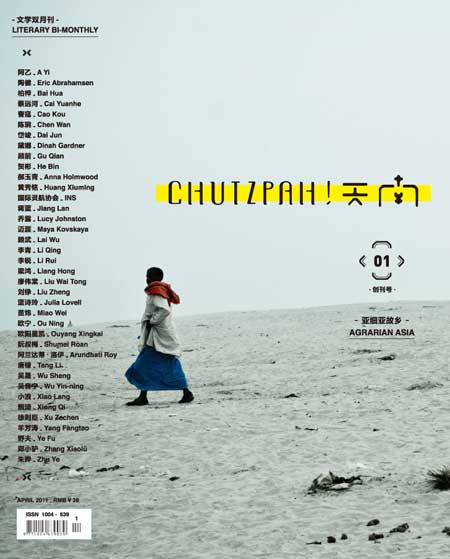Mook who's talking
 |
|
Cover of quarterly mook O-pen. |
The demise of controversial blogger Han Han's magazine Party hasn't thwarted those with the same publishing dream; rather, this spring has seen the launch of several more literary "mooks" (magazine-books), though with perhaps milder intent and wider potential readership.
With bestselling authors as their chief editors and advocates, magazines such as O-pen, Zui series and Chutzpah! immediately created a buzz on Chinese microblogs, topping sales charts and becoming the talk of literary circles.
Breaking silence
Long-silenced popular novelist Annie Baby came back into spotlight by launching her Chinese-language quarterly mook, entitled O-pen, last month, teaming up with four other well-known writers, a critic, translator and publisher from the Chinese mainland, Hong Kong and Taiwan. Publisher Thinkingdom House has claimed subscriptions of the first issue exceeded one million copies.
Despite criticism that the cover resembles Japanese quarterly Kangaeruhito, O-pen is still a hit with its unrivaled contents including a three-day long interview with 1Q84 author Haruki Murakami and an unpublished work from 1953 by Chou Tso-je, younger brother of literary master Lu Xun, whose son died last week, as well as a Chinese translation of Pharmacy, a short story from Elizabeth Strout's Pulitzer Prize-winning collection Olive Kitteridge.
With the tagline "respect for writing and dedicated to reading" in a fast-paced Internet age, O-pen boasts of keeping a distance from web-connected "excessive information" and shows a willingness to go backwards against the cyber-grain.
"A good literary magazine should be consumed slowly, lingered over long enough, and benefit readers," said Annie, who aims to offer dense and heartfelt stories not found in other magazines.
Twin peaks
Last December, bestselling author Guo Jingming, 27, launched twin bi-monthly magazines in addition to his already well-liked monthly Zui Novel.
Embracing refreshing aesthetics and intriguing names, Zui Fount and Zui Found are two distinctive publications run by a pair of young female novelist, Luo Luo and Di An. Their personal styles are infused into the selections of fictions and interviews with authors.
Zui Fount focuses on the female lifestyle, with cute illustrations, Polaroid photos and sentimental stories, as the on-off collaboration of Guo and former designer, Hansey Li sees the pair together again, ensuring overall visual quality.
Zui Found, meanwhile, is a darker version of the format, featuring more serious literature and works from young, as well as noted, writers including Shen Congwen, Shi Tiesheng, and Bi Feiyu.
Both magazines are for readers between 18 and 30. "Imagine one of our female readers has grown up from 16 to 21 and she needs something different from Zui Novel, which is primarily for readers between 14 to 20," Guo said of their target audience.
Chen Zishan, a literature professor from East China Normal University, said there is nothing unusual about bestselling young writers setting foot in literary magazines, since they are only following in the path of the older generation, picking up the tradition, near-defunct during anti-intellectual purges of the late twentieth century, that writers themselves should run literary magazines.
Almost all new writers in China used to have this experience, Chen noted. "It was a unique scene that had many writers engaged in publishing magazines in the past century, no matter young or old, which had a great influence on the development of new literature."
He explained that a magazine is a faster and easier way for winning readers and expanding influence, since it is the product of "print capitalism."
New tradition
In China, literary magazines faded during the 1990s as books became the mainstream; under such circumstances, newcomers should have the chance to cultivate readers' interest with good marketing, according to Li Jingze, chief editor of People's Literature.
"Commercial success is essential to survival of a magazine because it is a 'product'' in the first place. Unlike books, editors should have reader's expectations in mind to ensure regular publication," he said.
Meanwhile, Chutzpah!, a Chinese literary bi-monthly is yet another mook from Modern Media launched on April 1. Together with Peregrine, an English companion publishing translated Chinese works, the magazine is expected to build a bridge between Chinese writers and Western readers, since "most Chinese writers are not yet known to the Western world except a few such as Mo Yan, Yu Hua, Yan Lianke and Bi Feiyu," said Ou Ning, editor-in-chief.
The debut issue had the theme of "Agrarian Asia" and saw articles on rural Asia history, agricultural reality and social movements of intellectuals engaging in rural construction, with works by Indian writer Arundhati Roy, Chinese writer Li Rui and A Yi.
Far left: Cover of quarterly mook O-pen.
Left: Cover of bi-monthly Zui Fount.
Below: Pages of Zui Fount.
Inset: Cover of bi-monthly Chutzpah!.
 0
0 







Go to Forum >>0 Comments